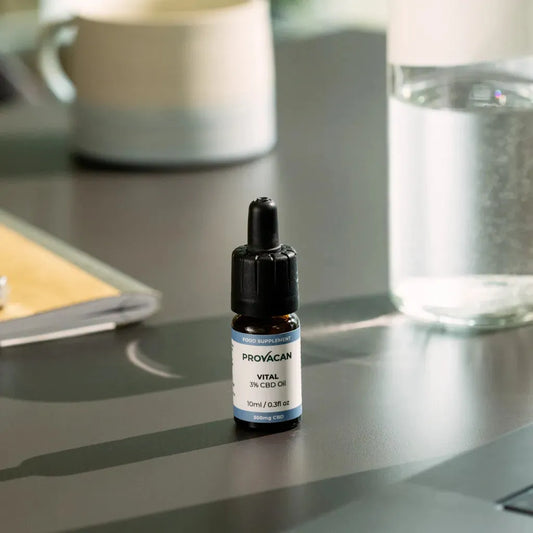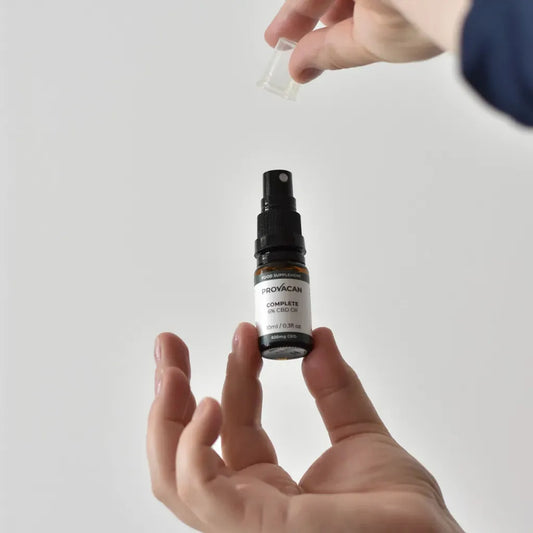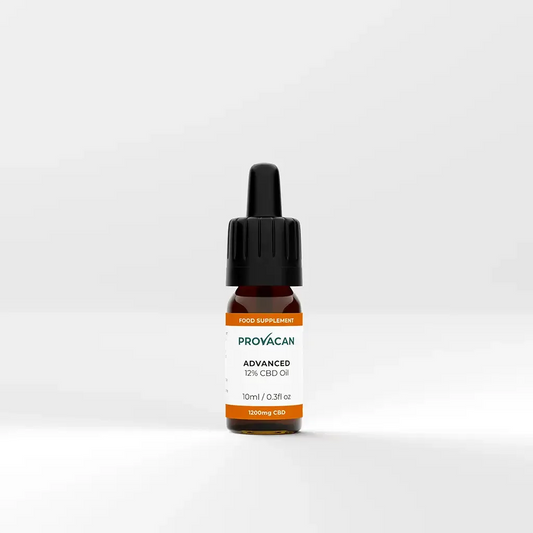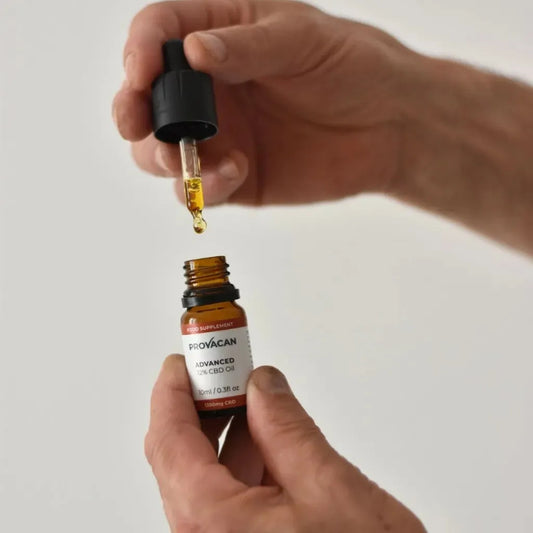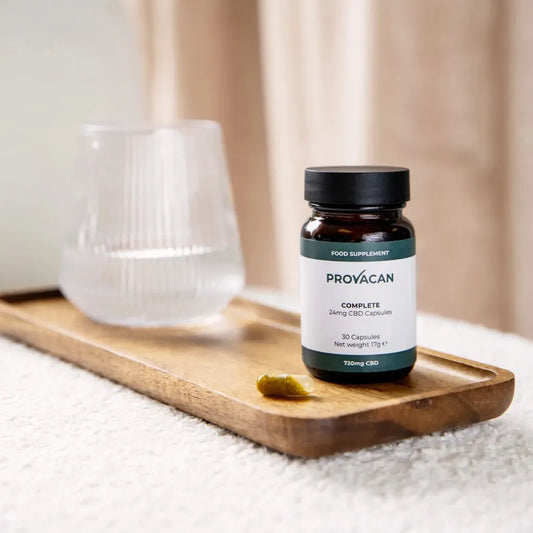As a leading provider of premium, laboratory tested CBD products in the UK, Provacan have conducted a new research study with Dave Gibson, a sought-after researcher and expert on sleep, stress and wellbeing. This study found that 40% of British parents resort to alcohol, vaping, or smoking to manage the increased stress during summer school holiday, with 82% engaging in these habits every or most nights.
Key Takeaways:
- Parental stress and sleep challenges: During school holidays, 40% of British parents use alcohol, vaping, or smoking to cope with stress, with 82% engaging in these habits frequently. This leads to poor sleep, with 77% of parents getting less than 8 hours of sleep per night. Interestingly, the age of children does not significantly affect stress levels among parents.
- Screen time and sleep disruption: High screen time before bed, including increased phone use, disrupts sleep by affecting melatonin production and keeping the brain active. To improve sleep quality, it's recommended to avoid screens for at least an hour before bed and replace this habit with calming activities like reading or listening to music.
- Strategies for better sleep: Effective sleep strategies include reducing screen time, maintaining a consistent bedtime routine, and engaging in physical activity. Establishing a relaxing pre-bedtime routine and getting morning sunlight can also help regulate your body clock and improve overall sleep quality.
How do school holidays impact parents' sleep?
Alcohol as a coping mechanism
During the summer, when children are off school:
42%
of parents have less than 6 hours of sleep per night
VS
63%
of non-parents declare getting more than 8 hours
To de-stress and relax during school holidays, nearly three quarters of parents (74%) heavily depend on alcohol.
Screen time before bed goes up in summer
Although 40% of non-parents surveyed preferred outdoor activities and 37% favoured physical exercise, they were as likely to take their phones to bed as parents rather than reading a book or magazine or listening to music to relax before bedtime. And 31% of parents who use their phones in bed do so more frequently during the summer holidays.
Regular screen time before sleep may be hindering your ability to fall asleep and stay asleep
Screens emit blue light, which disrupts your body’s melatonin production - the naturally occurring hormone making you feel sleepy. The stimulating content on phones, especially social media scrolling, also keeps the brain active and makes it harder to wind down.
Difficulty maintaining work-life balance and financial strain
Parents reported the main stress factors were:
42%
maintaining
work-life balance
36%
financial strain
34%
lack of personal time
Non-parents also mentioned financial strain (40%) but seasonal health concerns like allergies (37%) came second, as they spend more time socialising with friends than parents. Over a third of both parents and non-parents believe the long-term effects of summertime stress and reduced sleep are negative or very negative.
Dave Gibson, sleep expert who has worked within the NHS as a Sleep Coach and worked on the BBC’s Strictly Come Dancing as an Osteopath said “Less than 6 hours is a level of sleep deprivation which will have long term health problems such as raised levels of heart disease and higher risk of developing diabetes”.
Age is just a number
It is interesting to note that the age of children has minimal impact on parental stress levels during school holidays. Parents reported moderate or significant stress increases:
25%
with primary school-aged children
24%
with secondary
school children
20%
with sixth form or college-aged kids
How to get good sleep during school holidays
Dave Gibson said: “The main concern unveiled by this research is the reliance by many parents on alcohol and nicotine used before bed - this is terrible for sleep and restfulness. Whilst alcohol’s sedative effects can help you nod off, drinking alcohol within three hours of bedtime can then wake you during the night and reduce your sleep quality. You should stop all nicotine around four hours before you sleep, as it’s a stimulant and makes it harder to fall asleep and then stay asleep”.
There are many positive remedies that you can try, whether you’re a parent or not, to improve your sleep and reduce your stress.
@provacanhealth Want to know how to get good sleep during the school holidays? We’ve partnered with Dave Gibson, the UK’s leading sleep and stress expert to share his top tips to improve your sleep and reduce stress, whether you’re a parent or not. #Provacan #ProvacanWellbeing #sleeptips ♬ Good Facts - ALEKSANDAR KIPROV

1. Reduce screen time
For better sleep hygiene, avoid looking at screens for at least an hour before bed. Limiting this regular screen time and replacing this habit with a calming activity such as reading could improve your sleep, as reading has been shown to reduce stress by 68%(1). If you find it difficult to resist using your phone in bed, consider keeping your phone out of the bedroom entirely and using a dedicated alarm clock instead.

2. Keep a consistent bedtime schedule
During summer holidays, many adults have late nights, non-parents spend time socialising whilst parents lack personal time and may stay up later to compensate. Avoid disrupting your sleep schedule and habits by sticking to a routine as much as possible to help your brain associate bedtime with sleep. Maintaining regular times to sleep and wake up reinforces your circadian rhythm, your body’s internal clock, leading to more restful and uninterrupted sleep.

3. Create a pre-bedtime routine
Try to create a comfortable sleeping environment by turning down the lights early to enhance melatonin production, the sleep hormone. Keep your bedroom dark, cool, and quiet. To help lower stress levels and get restful sleep, establish a consistent bedtime routine, which might include activities like taking a bath, meditating, or using a sleep aid such as CBD oil. A cup of herbal tea like chamomile can also be a soothing addition to your routine. Instead of using your phone in bed, consider reading a book (a third of study participants do this) or listening to music (over a quarter of participants do this). Stick to the same routine each night to signal to your brain that it's time for sleep, making it easier to drift off.

4. Increase physical activity
More than a third (36%) of parents in the study use physical activity to manage stress. Engaging in cardio exercises can enhance sleep quality by boosting deep sleep, but it's best to finish cardio workouts at least an hour before bedtime to avoid raising your core body temperature, which can interfere with sleep. Even a 20-30 minute walk three times a week has been shown to improve sleep.

5. Establish a relaxing morning routine
Getting sunlight first thing in the morning helps regulate your body clock, so open your curtains or blinds as soon as you wake up. If you often feel stressed in the morning, try to start your day slowly by delaying screen time until after breakfast. Instead, head outside to soak up sunlight and try to get at least 30 minutes of outdoor exposure each day to maintain a healthy body clock, which can make it easier to fall asleep at night.
Read also:
Sources:
(1) Lewis, D. (2009), Galaxy Stress Research, Mindlab International, Sussex University, UK.
About the research:
A nationally representative poll was carried out by leading research company Opinium between 11th and 19th July 2024. The sample was 2,000 UK parents of under 18s, as well as 2,000 UK adults who do not have children.



